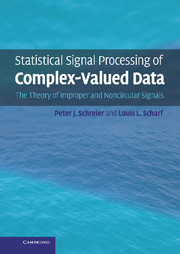Appendix 2 - Complex differential calculus (Wirtinger calculus)
Published online by Cambridge University Press: 25 January 2011
Summary
In statistical signal processing, we often deal with a real nonnegative cost function, such as a likelihood function or a quadratic form, which is then either analytically or numerically optimized with respect to a vector or matrix of parameters. This involves taking derivatives with respect to vectors or matrices, leading to gradient vectors and Jacobian and Hessian matrices. What happens when the parameters are complex-valued? That is, how do we differentiate a real-valued function with respect to a complex argument?
What makes this situation confusing is that classical complex analysis tells us that a complex function is differentiable on its entire domain if and only if it is holomorphic (which is a synonym for complex analytic). A holomorphic function with nonzero derivative is conformal because it preserves angles (including their orientations) and the shapes of infinitesimally small figures (but not necessarily their size) in the complex plane. Since nonconstant real-valued functions defined on the complex domain cannot be holomorphic, their classical complex derivatives do not exist.
We can, of course, regard a function f defined on ℂn as a function defined on ℝ2n. If f is differentiable on ℝ2n, it is said to be real-differentiable, and if f is differentiable on ℂn, it is complex-differentiable. A function is complex-differentiable if and only if it is real-differentiable and the Cauchy–Riemann equations hold. Is there a way to define generalized complex derivatives for functions that are real-differentiable but not complex-differentiable?
- Type
- Chapter
- Information
- Statistical Signal Processing of Complex-Valued DataThe Theory of Improper and Noncircular Signals, pp. 277 - 286Publisher: Cambridge University PressPrint publication year: 2010



